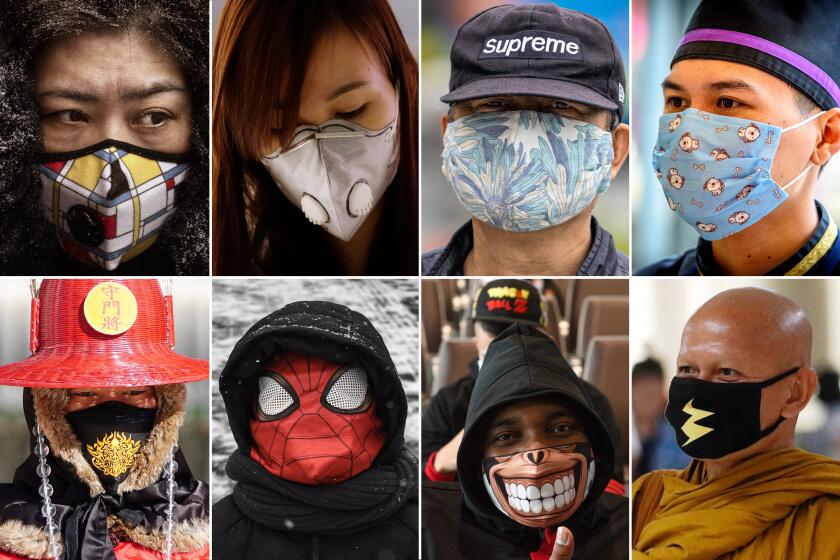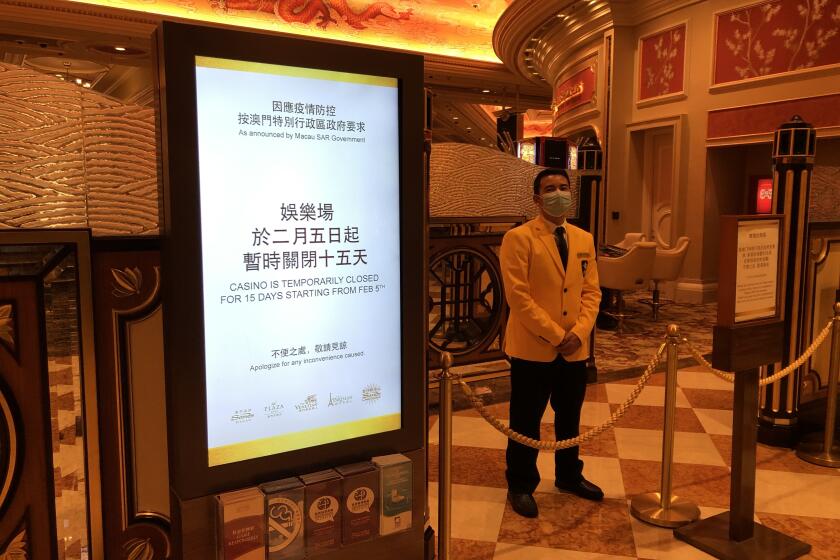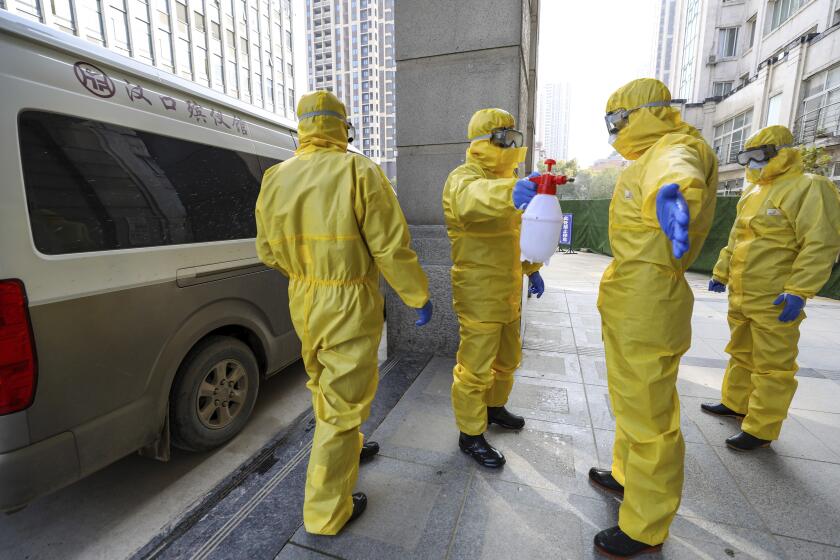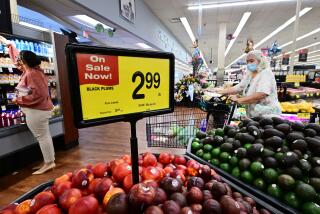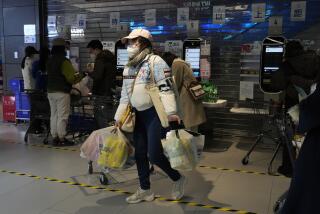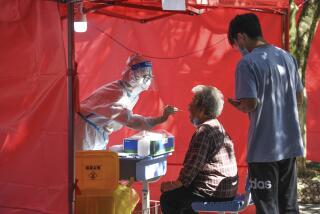Coronavirus outbreak spurs hoarding in Asia
On Friday evening, supermarkets in Taipei put out their usual stocks of toilet paper, stacked floor-to-ceiling in brick-sized packets stuffed into bags decorated with colorful cartoon characters.
By Monday, just barren racks — and bewildered shoppers — were left.
In Taiwan, Hong Kong and Singapore, shoppers are stockpiling toilet paper, hand sanitizers, rice, instant noodles, cured meats, sanitary napkins and other products as fears over the new strain of coronavirus from China continue to ripple across Asia.
Many consumers are worried that more infections in their countries and territories — which have some of the highest numbers of coronavirus cases outside China — will make it unsafe to go shopping. Others are concerned that the Chinese economy will be weakened by the outbreak and unable to keep exporting the goods many rely on.
Still others were scared when images of empty shelves and snaking lines outside supermarkets flooded social media over the weekend, making them think they should be stocking up too.
“This is mental illness, too much panic,” griped Chiu Yuan-chao, 50, a Taipei elementary school volunteer and mother of two.
Chiu tried to order toilet paper online Monday after she realized supermarkets were empty, but the e-commerce website she usually uses was sold out. She eventually tracked down three small packs at a convenience store.
“I’m not too worried yet,” Chiu said. “But if China can’t get a lid on this outbreak or find a cure, then there will be more panic.”
Since the virus began popping up outside China in January, consumers from the U.S. to Southeast Asia have been buying up protective masks to guard against infection, even though doctors say the thin masks cannot stop transmission. Some of the hoarding in Taiwan is driven by reports that toilet paper and sanitary napkins could be used, in a pinch, as makeshift masks.
With face masks nearly impossible to find in Asia stores, people share creative alternatives on social media: a mask made of a maxi pad? Half an orange?
“When there is this sort of extraordinary demand, it’s simply a question of fear,” said Liang Kuo-yuan, president of Yuanta-Polaris Research Institute, an economic think tank in Taipei, the Taiwanese capital. “You can impose some controls, but once a government does something like that people become even more afraid.”
The virus that was discovered in Wuhan, China, in December had killed 1,118 people as of Wednesday — more than the SARS epidemic that originated in China in 2003 — but with only one fatality outside China. The Chinese government responded by imposing lockdowns in Wuhan and much of surrounding Hubei province, while multiple Asian countries have banned travelers from China.
A dozen Asian countries have reported cases of the virus but no signs that the outbreak is spreading rapidly among the general population.
A closure of the industry to stop the coronavirus comes as casino operators such as Las Vegas Sands and MGM Resorts are aiming to win new gaming licenses.
In Singapore, which has 47 coronavirus cases, the most outside China, the government raised its disease alert level Friday to orange, indicating a severe outbreak was spreading from person to person.
After the announcement, shelves were emptied of hand sanitizer, napkins, tissues, noodles, rice and other staples, with many Singaporeans fearing what would happen if the threat were elevated to red, the highest level.
Singaporeans, who boast the highest per-capita income in Asia and pride themselves on the efficiency of their authoritarian city-state, are also known for a ruthless survival instinct. It’s a result of the country’s small size and scant natural resources, and produces a national ethos that fears losing out.
“No hand sanitizer, no canned goods, no paper products,” lamented Jeeva Pillay, a 45-year-old data engineer who moved to Singapore from South Africa last month.
She and her husband spent much of Sunday waiting in line at another supermarket for paper towels and cleaning supplies for their new apartment, but coming away empty-handed.
“Clearly people are panicking,” Pillay said. “We didn’t feel like there was a need to stock up but now we feel like we have to follow suit.”
The run on goods prompted the government-linked NTUC FairPrice grocery chain to limit purchases: four packs of paper products such as toilet paper, two bags of rice, four packets of instant noodles and about $36 worth of vegetables.
Over the weekend, Singapore Prime Minister Lee Hsien Loong urged residents to not panic and insisted the government was better prepared than during the SARS epidemic.
“We are not locking down the city or confining everybody to stay at home,” Lee said. “We have ample supplies, so there is no need to stock up with instant noodles, tinned food or toilet paper, as some people did yesterday.”
The alert prompted fears of being holed up indoors indefinitely, said Rajiv Biswas, a Singapore-based economist at market research firm IHS Markit.
“People became very nervous,” Biswas said. “Supermarket shelves were empty over the weekend I guess because people were planning to bunker into their houses until this was over.”
In Hong Kong, fears of the virus, which has infected 50 people, have cleaned out nearly all stocks of sanitary goods. Consumers line up at the semiautonomous Chinese territory’s dispensaries up to five hours before they open, sometimes pouncing on toilet paper seconds after the shelves are restocked.
Rice, canned sardines and lunch meats were also selling out.
The panic buying recalled the anxious days of 2011, when fears of radiation emanating from the earthquake-damaged Fukushima Daiichi nuclear reactor in Japan fueled a run on table salt in Hong Kong, out of an erroneous belief that iodine would ward off ill effects.
“In both situations people are panicking when facing hazards, so I think the [people’s] attitude is not improved,” 19-year-old Hong Kong shopper Hailey Yan said. “But for now, with better technology, we have more access to information. The younger generation is more objective when facing rumors of hoarding, but for some elder people, they still have the idea of stocking up on food to prevent hunger.”
It’s the biggest medical mystery on the planet: Just how deadly is the new coronavirus from China?
Panicked bulk buying of surgical masks has also been reported in Japan, South Korea, Thailand and Vietnam.
South Korean authorities last week stiffened penalties for hoarding masks or sanitizing liquids. Violators face up to two years in prison or fines of about $42,000.
Authorities in Taiwan, which has reported 18 coronavirus infections, this week recommended prosecution for three women suspected of spreading social media messages suggesting that toilet paper, table napkins and sanitary napkins could be used to craft mask substitutes, and warning that those products could soon be in short supply. The women could be prosecuted under anti-fake news laws passed in early 2019 to prevent rumors affecting consumers.
The Taiwanese government’s Industrial Development Bureau clarified on its Facebook page that those paper goods couldn’t be used for masks. The bureau’s deputy director, Yang Bo-ken, said this week that suppliers were ready to restock toilet paper in stores, although clerks told customers it could take several days for the goods to reach shelves.
Liang, of the Taipei think tank, said governments in the region should ensure they can ship enough nonperishable goods from outside China in case the virus incites more panic.
“The most important thing they can do is ensure supplies,” he said.
Special correspondent Jennings reported from Taipei and Times staff writer Bengali from Singapore. Special correspondent Antonia Tang contributed to this report from Hong Kong.
More to Read
Start your day right
Sign up for Essential California for news, features and recommendations from the L.A. Times and beyond in your inbox six days a week.
You may occasionally receive promotional content from the Los Angeles Times.
